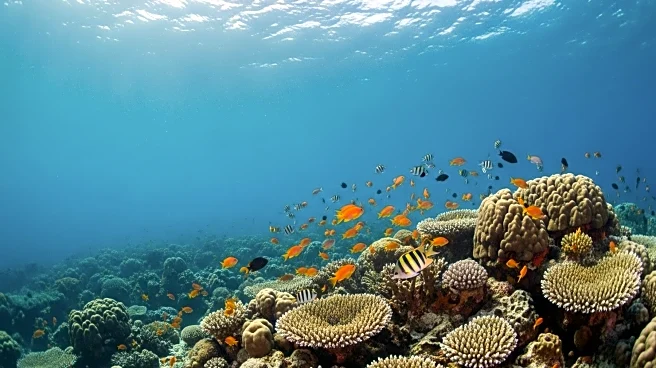What's Happening?
Researchers at UC Santa Barbara's National Center for Ecological Analysis and Synthesis have released a study indicating that the cumulative impact of human activities on the oceans is expected to double by 2050. Led by marine ecologist Ben Halpern, the study highlights the pressures from ocean warming, fisheries biomass loss, sea level rise, acidification, and nutrient pollution. The research, published in the journal Science, suggests that the tropics and poles will experience the fastest changes, with coastal areas bearing the brunt of these impacts. The study builds on previous work that mapped human activity on the oceans, revealing that 41% of marine environments are heavily impacted.
Why It's Important?
The findings underscore the urgent need for policy interventions to mitigate the impacts of climate change and improve fisheries management. As the oceans face increasing pressures, the capacity of ecosystems to cope with environmental changes may be exceeded, posing significant challenges for human societies. Coastal regions, where human reliance on ocean resources is highest, are particularly vulnerable. Countries dependent on the ocean for food and livelihoods could face substantial increases in impacts, necessitating proactive measures to protect marine environments and sustain economic benefits derived from the oceans.
What's Next?
The study calls for immediate action to reduce human impacts on the oceans, emphasizing the importance of enacting policies to address climate change and strengthen fisheries management. Researchers suggest prioritizing the management of habitats expected to be heavily impacted, such as salt marshes and mangroves, to alleviate pressures. The study serves as a warning, urging stakeholders to alter the projected future through effective planning and intervention.
Beyond the Headlines
The research highlights the ethical responsibility of human societies to protect marine environments for future generations. The potential long-term shifts in ocean ecosystems could have profound cultural and economic implications, affecting global food security and biodiversity. The study advocates for a comprehensive approach to ocean management, integrating scientific insights into policy-making to ensure sustainable use of ocean resources.










